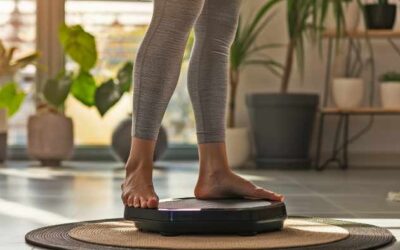by Susan Stamper •
Content Marketing Manager, ChiroHealthUSA •
Social media is like that bottomless basket of chips at a Mexican restaurant—tasty at first, but before you know it, you’re three baskets deep and wondering why you feel bloated. We love it because it helps us stay connected, peek into our cousin’s vacation photos, or chuckle at a baby goat in pajamas. But let’s be honest: it’s also a time thief in tie-dye pants, robbing us of minutes, hours, and sometimes whole days.
Take me, for example. Just the other Sunday after church, I was happily riding shotgun (a.k.a. passenger princess duties 👑) and scrolling Facebook when I blurted out to my husband:
“Hey, aren’t you supposed to use rebar in concrete?”
He raised an eyebrow. “Yes… why?”
“Because this guy’s advertising his concrete company, and none of his work photos have rebar in them!”
My husband just stared and finally asked, “And how, exactly, does this affect your life right now?”
Spoiler: it didn’t. 👀
That was my wake-up call–It may be time for a break. Since I manage CHUSA’s social media for work, my weekdays are already screen-heavy, so as a family, we decided to take a month-long break from personal social media. I kept our business accounts active but deleted the rest.
And let me tell you—when you’re not glued to TikTok or Instagram, you suddenly realize just how much of your brain space was filled with random trivia, saved recipes you’ll never make, and DIY projects you’ll definitely never do. (I mean, who really needs to know 47 ways to repurpose a mason jar?)
So let’s dig into the wild world of the digital detox—what it is, why it matters, and how to make it work without feeling like you’ve exiled yourself to 1993.
The Downside of Being “Always On”
We joke about it, but constant screen time really can mess with us in ways that aren’t so funny. Picture your brain as a smartphone: if you never close apps, eventually the thing overheats, freezes, and starts doing weird stuff. That’s basically what happens to us when we live online 24/7.
- Mental health takes a hit. Heavy social media use has been linked to anxiety, depression, and loneliness—even though it’s supposed to help us feel “connected” (Liebert, 2019). It’s like showing up at a party 🎉 and spending the whole time comparing your outfit to everyone else’s.
- Sleep? What’s that? Blue light from screens tricks your brain into thinking it’s still daytime, so melatonin production tanks (MDPI, 2023). Translation: scrolling yourself to sleep = tossing and turning like a fish out of water 🐟.
- Body aches galore. “Tech neck” from looking down, sore eyes 👀, stiff backs, and the dreaded “I-sat-too-long” legs… our bodies weren’t built for 10-hour scrolling marathons (PMC, 2024).
It’s not just wasted time—it’s a slow, sneaky drain on your well-being.
What Exactly Is a Digital Detox?
Think of it like a juice cleanse—but for your brain instead of your digestive tract. A digital detox means intentionally reducing or completely pausing your use of digital devices like smartphones, tablets, and social media platforms.
The goal isn’t to punish yourself; it’s to give your mind, body, and relationships a reset. Like unplugging your Wi-Fi router when it’s lagging—sometimes you just need to hit restart.
Why We’re Hooked in the First Place
Our phones are designed to be sticky—like cotton candy at a carnival: bright colors, instant feedback, endless scrolling. Scientists even say social media taps into the same dopamine-driven reward system as gambling. Every “like” is a tiny slot machine win, keeping us coming back for more. 🎰
But just like eating frosting straight from the can, what feels good in the moment can wreak havoc on your long-term health.
The Health Perks of Powering Down
You might think scrolling is harmless, but research suggests otherwise. Spending too much time in the digital world can mess with your sleep, mood, posture, and even your social connections. Here’s the scoop:
- Better Sleep 😴
Screens emit blue light that mimics sunlight. Translation: late-night doomscrolling keeps you wired. Studies show reducing screen time, especially before bed, can help improve sleep quality (He et al., 2024). More Z’s, less grogginess.
- Sharper Focus & Less Stress
Constant notifications are like little digital woodpeckers tapping at your brain. Ding! Buzz! Ping! A detox helps reduce stress and improve focus (Sharma et al., 2023). Imagine the relief of quieting that nonstop mental group chat.
- Boosted Mental Health
Heavy social media use has been linked to higher rates of anxiety and depression, particularly in younger people (George et al., 2025). Cutting back allows your brain to recalibrate, boosting overall well-being.
- Improved Posture & Reduced Pain
“Tech neck” is real, folks. Hours hunched over phones can cause chronic pain (Elhai et al., 2019). Less scrolling = happier spine. And let’s be real, chiropractors love that.
- Stronger Real-Life Connections
How often have you been half-listening to your kids or spouse while secretly checking Instagram? (Guilty 🙋♀️). Digital detoxing can help you be more present, deepening relationships (Twenge et al., 2025).
Signs You Might Need a Detox
You don’t have to live in a yurt or throw your phone in a river to admit maybe—just maybe—you’ve had a little too much screen time. Let’s play a little game of “Is it me?” 🤔
- Screen 1st, Spouse 2nd: You check your phone before you even say “good morning” ☀️ to your spouse.
- Phantom buzzing: You swear your phone vibrated… but nope, it’s just your brain messing with you.
- Scroll blackouts: You sit down to “just check notifications” and suddenly it’s dark outside.
- Mood rollercoasters: A stranger’s beach pics shouldn’t ruin your day, yet here we are.
- Neck like a question mark: Constant craning leaves you walking around shaped like a lowercase “r.”
- Sleep thief: You told yourself “just one more video” at 10 PM, and suddenly it’s 1 AM.
If you’re nodding along… yeah, friend, it’s time. Time to consider unplugging—at least for a while.
How to Actually Do a Digital Detox Without Losing Your Mind
- Start tiny. No screens at dinner 🍽️. Phone in another room at bedtime 🛏️. Easy wins.
- Replace the scroll. Read actual books 📚. Journal ✍️. Stare at the ceiling. (Seriously, boredom is healthy—it sparks creativity 💡.)
- Go retro. Dust off a paperback or a board game. Monopoly is more intense than any Twitter thread, trust me.
- Make “no phone zones.” Bedrooms, dinner tables, bathrooms (yes, I said it).
- Step outside. Vitamin D > TikTok 🌞. Nature doesn’t ask you to like, comment, or subscribe. See our last blog for more on this!
- Buddy system. Grab a friend or family member to detox with you—it’s harder to cheat when someone’s watching 👯.
Our Family Detox Experiment
When my family decided to hit pause on personal social media for a month, we weren’t sure how it would go. Would we feel disconnected? Bored? Start making sock puppets just for entertainment?
The first few days were rough—I kept reaching for my phone out of pure habit, like muscle memory. My kid, too, kept asking, “Can we just check this one thing?” But after the first week, something shifted.
We started having more conversations at dinner (and I mean actual conversations, not just grunts between bites). We went on more walks. Even chores got done faster without the constant temptation of scrolling breaks. And the funniest part? After a few weeks, none of us missed it. The noise quieted down, and life felt just a little more… ours.
It wasn’t about ditching technology forever—it was about resetting our relationship with it.
The FOMO Factor
The biggest fear about detoxing? Missing something important. But here’s the thing—if it’s truly important, you’ll find out. No one’s life has ever fallen apart because they missed a trending meme. In fact, I’ve already had multiple people send me FB screenshots—completely unprompted—just to “keep me in the loop.” So even when you log off, your circle usually makes sure you don’t miss the good stuff.
And honestly, when you give your brain space, you gain something better: creativity. Research shows stepping away from screens actually helps problem-solving and innovative thinking (American Academy of Pediatrics, 2024).
But Wait—What About AI?
Let’s address the digital elephant in the room. AI is convenient, maybe too convenient. If we let machines do all our thinking, we risk turning our brains into underused gym memberships—lots of potential, zero gains.
So use AI and technology wisely, but keep your curiosity sharp. Research, question, and think for yourself. If you’re not thinking for yourself, then someone else is thinking for you (like big tech or government).
Final Thoughts
Digital devices aren’t evil—they’re tools. Like a hammer, they can help you build something great… or they can smash your thumb if you’re not careful. Taking time to step away, rest, and reset is like giving yourself a tune-up.
So, maybe it’s time we all considered a digital detox. Not forever—just long enough to remind ourselves that the world outside our screens is still spinning, sunsets are prettier in person, and no, we really don’t need to know how concrete without rebar will hold up. 😉
Sources
- American Academy of Pediatrics. (2024). Digital detox and well-being. Pediatrics, 154(4), e2024066142. https://doi.org/10.1542/peds.2024-066142
- Elhai, J. D., Levine, J. C., Alghraibeh, A. M., Alafnan, A. A., Aldraiweesh, A. A., & Hall, B. J. (2019). Fear of missing out: Testing relationships with negative affectivity, online social engagement, and problematic smartphone use. Cyberpsychology, Behavior, and Social Networking, 22(3), 140–146. https://doi.org/10.1089/cyber.2019.0578
- George, M. J., Ellison, N. B., & Twenge, J. M. (2025). The digital age and adolescent mental health: A review. Frontiers in Human Dynamics, 5, 1572587. https://doi.org/10.3389/fhumd.2025.1572587
- He, J., Zhao, M., & Chen, S. (2024). Impact of nighttime screen exposure on adolescent sleep: A systematic review. International Journal of Environmental Research and Public Health, 21(7), 1004. https://doi.org/10.3390/ijerph21071004
- Sharma, A., Sood, R., & Kaushik, A. (2023). Effects of digital detox interventions on stress and well-being: A systematic review. Anti-Aging Eastern Europe, 2(1), 68–75. https://doi.org/10.56508/aaee.v2i1.68
- Twenge, J. M., Haidt, J., & Campbell, W. K. (2025). Screens, teens, and mental health: Trends and implications. Contemporary Journal of Psychology, 14(2), 254–271. https://doi.org/10.1177/CJP.2025.254








